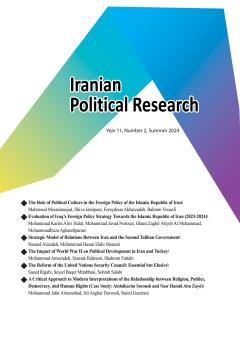International Sanctions Against the Islamic Republic of Iran and the Shift in Power Dynamics in West Asia
Subject Areas : Iranian Political Research
Behroz Hatami
1
,
Mehdi Khoshkhati
2
*
![]() ,
Farshid Jfari
3
,
Farshid Jfari
3
![]()
1 -
2 - Assistant Professor, Department of Political Science, Zanjan Branch, Islamic Azad University, Zanjan, Iran
3 - Assistant Professor, Department of Political Science, Zanjan Branch, Islamic Azad University, Zanjan, Iran
Keywords: International Sanctions, Islamic Republic of Iran, Power Dynamics, West Asia, United States, Nuclear Energy.,
Abstract :
Using a descriptive-analytical method and employing the theory of international regimes, this study addresses the question: how have international sanctions against the Islamic Republic of Iran affected shifts in power dynamics in West Asia? The findings indicate that international sanctions have brought substantial changes to Iran’s military, economic, and diplomatic policies in the region, intensifying regional rivalries and tensions. Although these sanctions have negatively impacted Iran’s economy, they have not fully achieved the West’s objectives against the country and have, instead, contributed to increased geopolitical tensions in the region. On
the other hand, the Islamic Republic of Iran has mitigated these pressures through diplomatic tools, informal networks, and alternative pathways, maintaining its influence in the region. Furthermore, despite the economic challenges imposed by the sanctions, Iran has bolstered its military power and continued its support for the "Axis of Resistance" in countries like Iraq, Syria, Lebanon, and Yemen, asserting a pivotal role in regional equations and remaining a key player in West Asia.
حشمتزاده، محمدباقر (1384). مقدمه و چارچوبی برای بررسی تاثیرات انقلاب اسلامی در کشورهای اسلامی. پژوهش، شماره 12، ص212-234.
خواجی، غلامرضا (1391). تحریم اقتصادی از منظر حقوق بینالملل با تاکید بر حقوق بینالملل اقتصادی و حق توسعه. حقوق اقتصادی، (2)19، ص1-20.
سجادپور، سید کاظم؛ وکیلی، فرهاد (1394). رژیم تحریمهای بینالمللی: بنیانها، فرایندهای تصمیمساز، نهادهای مجری و سنجش کارایی. روابط خارجی، (1)7، ص39-64.
قادری کنگاوری، روحالله (1392). نظریه مقاومت در روابط بینالملل؛ رویکرد ایرانی- اسلامی نفی سبیل و برخورد با سلطه. سیاست دفاعی، 21(82)، ص191-248.
لیتل، ر. (۱۳۸۳). رژیمهای بینالمللی. در: جان بیلس و استیو اسمیت: جهانی شدن سیاست: روابط بینالملل در عصر نوین، ترجمه ابوالقاسم راهچمنی و همکاران. تهران: موسسه مطالعات فرهنگی ابرار معاصر.
مختاری هشی، حسین (1394). تاثیر تحریمهای بینالمللی بر عوامل قدرت ملی؛ با تاکید بر تحریمهای شورای امنیت سازمان ملل بر علیه جمهوری اسلامی ایران. ژئوپلیتیک، 11(2)، ص134-173.
Bajoghli, N. (2023). Iran in Latin America: Building Alliances for Busting Economic Sanctions. Humanity: An International Journal of Human Rights, Humanitarianism, and Development, 14(2), p. 309-324.
Cordesman, A.H. (2009). Iranian Weapons of Mass Destruction: The Birth of a Regional Nuclear Arms Race? Praeger, Available at: https://a.co/d/6qoTDbW
Felbermayr, G.J., Syropoulos, C., Yalcin, E. & Yotov, Y. (2019). On the effects of sanctions on trade and welfare: New evidence based on structural gravity and a new database. CESifo Working Paper, No. 7728. Available at:
https://www.cesifo.org/en/publications/2019/working-paper/effects-sanctions-trade-and-welfare-new-evidence-based-structural
Fitzpatrick, M. (2019). Iran's Ballistic Missile Capabilities: A Net Assessment. International Institute for Strategic Studies.
FMSO (2023). Iran's Strategic Alliances in Africa: A Growing Influence. Foreign Military Studies Office.
Garoupa, N.R. & Gata, J.E. (2002). A theory of international conflict management and sanctioning. Public Choice, 110(1-2), p. 41-65.
Gause, F.G. (2014). Beyond Sectarianism: The New Middle East Cold War. Brookings Institution Press. Available at: https://www.brookings.edu/articles/beyond-sectarianism-the-new-middle-east-cold-war/
Ghodsi, M. (2019). Iran’s Endogenous Role in the International Economic System. in Heinz Gärtner and Mitra Shahmoradi (Hrsg.), Iran in the International System. Between Great Powers and Great Ideas (S. 1-29). Routledge.
Haidar, J.I. (2017). Sanctions and export deflection: Evidence from Iran. Economic Policy, 32(90), p. 319-355. https://doi.org/10.1093/epolic/eix002
International Republican Institute (IRI) (2022). Foreign Authoritarian Influence in Latin America: Iran's Growing Reach. Available at: https://www.iri.org/news/foreign-authoritarian-influence-in-latin-america-irans-growing-reach/
Jones, S.G. (2019). War by Proxy: Iran’s Growing Footprint in the Middle East. Center for Strategic and International Studies. Available at: https://www.csis.org/analysis/war-proxy-irans-growing-footprint-middle-east
Katzman, K. (2020a). Iran Sanctions. Congressional Research Service. Available at:
https://fas.org/sgp/crs/mideast/RS20871.pdf
Katzman, K. (2020b). Iran's Foreign and Defense Policies. Congressional Research Service. Available at:
https://www.everycrsreport.com/files/20200130_R44017_381c9dad5c438629d12bcec0dcd25f7416b93294.pdf
Kaye, D.D. (2018). The Israeli–American Connection: Its Roots, Development, and Perpetuation. Wayne State University Press. Available at: https://a.co/d/5PTG8Yu
Krasner, S.D. (1983). International Regimes. Ithaca, NY: Cornell University Press.
Legrenzi, M. (2011). The GCC and the International Relations of the Gulf: Diplomacy, Security and Economy Coordination in a Changing Middle East. Available at:
Tauris. https://a.co/d/5JQGt8k
Maloney, S. (2015). Iran's Political Economy since the Revolution. Cambridge University Press.
Nephew, R. (2017). The Art of Sanctions: A View from the Field. Columbia University Press.
Riedel, B. (2017). Kings and Presidents: Saudi Arabia and the United States since FDR. Brookings Institution Press. Available at: https://a.co/d/gnz7G8E

